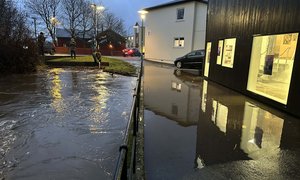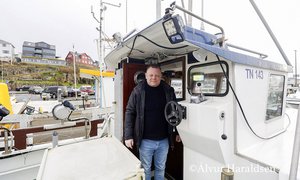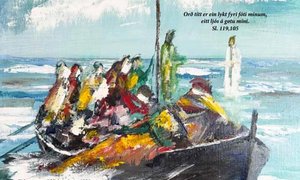– We must not afraid to impose demands upon the oil companies, which are active and intend to work in Faroe waters, says Mr Rasmussen. Supply Service Leirvik, which operated supply vessels from the Norwegian company Havila for the 2001 exploration round: – Since then we have had the opportunity to monitor developments and last year we were able to buy vessels.
Since then they have contracted four new supply vessels, which are currently being built, but they have since sold one of the vessels to a Norwegian company. Delivery will be next year and in 2009. These are so-called PSV vessels, or Platform Supply Vessels.
– Competition is fierce in the oil industry and it takes some doing to gain a foothold. Our operational area is especially capital demanding, but we are quite fortunate to have a cooperation with Havila, who also have a share in Supply Service, and through them we have access to a large amount of knowledge in this field, and this is a great advantage. If we are to establish ourselves in an oil industry, we have to attain the same competence levels as our rivals. If we are not competitive we can forget all about this industry.
Must not be afraid
On the other hand, Mr Rasmussen thinks that everything is entwined through the terms and conditions we impose upon the oil companies, and he is of the opinion that the Faroes must not be shy in this respect.
– Norwegians impose very stringent demands regarding safety and the protection of the environment and they demand knowledge of Nordic languages. It is possible to have the suspicion that some of the demands imposed are there to protect Norwegian interests and Norwegian industry, but at the end of the day it is the dollar everything revolves around. In any case we ought to impose very stringent demands regarding what equipment is permitted into Faroe waters to operate.
– We ought to do as the Norwegian do and set demands towards the oil companies so they are only permitted to use the newest and best vessels, which pollute our waters the least. We must at all costs prevent the old poor much polluting vessels where safety is compromised from entering our waters, just because we are afraid to set demands towards the oil companies, says Mr Rasmussen.
He says that in the Faroes we have strived to meet international demands. In Norway however, they impose their own demands for vessels working in the Norwegian oil industry and these are demands which come in addition to the international demands.
– They have for example a special duty on NOX. This means that a maximum has been set for how much detrimental waste can come from a vessel. In practical terms, this means that a badly polluting vessel must pay so much in duties, that it is not competitive, thereby excluding itself from working in a Norwegian oil industry.
He says that in Norway this duty is applicable to all vessels, also fishing vessels, but he is doubtful if it would be correct of the Faroes to set such demands for all vessels, as he thinks that the current existing industry should receive some years to adapt.
– In the Faroes the oil industry is a new industry and therefore it is perfectly in order to impose duties on vessels from day one.
He is also of the opinion, that we could demand all vessels should be dual-hulled to prevent a pollution situation arising: –Dually-hulled vessels are considerable safer, regarding oil leakage compared to normal vessels, so this is also a demand we ought to consider, says the CEO for Supply Service.
In this connection he adds that the vessels currently being built by Supply Service meet all the latest demands, are in excess in this respect of what is required for our waters. They are also dually-hulled. Simultaneously they have greatly stressed the crew are given the very best conditions in order they thrive onboard. In this respect he means noise levels and amenities, e.g. internet connection in each cabin and so forth.
Correct balance
On the other hand Mr Rasmussen says we should be careful not to impose demands we cannot follow up on. One of the demands he has in mind is the demand of a Faroe quayside. He thinks that as long as we are exploring for oil, we can defend such a demand, but the question how do we follow up and control such a demand if an oil industry emerges.
– I am not saying that such a demand is right or wrong, I am just saying that we should think carefully so we do not create an inflexible system, by imposing demands which are difficult to administer. A demand stating that all must pass a Faroe quayside also demands a large workforce and it is a question of where this workforce is to come from, as the current situation stands.
He believes one way is to open the doors fro foreign labour, but having a large number of foreigners come to the Faroes, poses its own problems and challenges.
– It is quite clear however, that if we end in a situation where we impose demands we are not capable of administering we will not create growth and we will make no progress, says Mr Rasmussen.
– Instead we should make it interesting for the oil companies, by having a legislation which is flexible to administer, and make it easy to operate in the Faroes, instead of imposing demands upon the license holder, where we cannot control if these demands are being complied with or not.
He adds that he suspects that the Faroese are somewhat afraid of imposing demands upon the oil companies in case they scare them off:
– I think there is no reason for such an attitude, because as long as the oil price is where it currently is, the Faroes will definitely be interesting. The oil companies are used to countries in our part of the world setting demands, says Mr Rasmussen.














